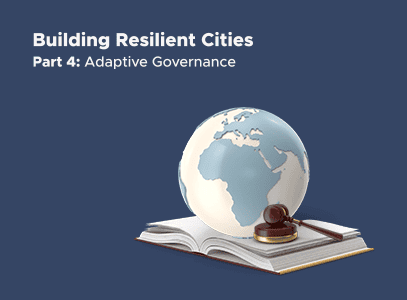See Part 1 of this two part blog series on monetary issues here.
The Lucas Paradox – which observes that there are often limited capital flows from developed to developing countries, despite higher potential returns to capital – poses one of the most frustrating conundrums of development economics. However, this frustration does not stem from an inability to explain why capital does not flow to poorer nations. In fact, many of the reasons are well-understood: economic and political volatility, unstable financial institutions, poor business environment, and lax or unenforced legal protections all tend to undermine investor confidence and limit actualized returns to capital. Rather, the frustration stems from a general inability to find adequate solutions to attract investment to capital-scarce countries in the absence of deep, nation-wide governance reforms. In this way, charter cities offer a potential solution; by establishing urban centers with stable institutions, charter cities may act as a ‘lightning rod’ for investment, allowing capital to flow into the country and usher in economic development for the nation as a whole.
Charter cities and special economic zones also offer host nations the opportunity to experiment with new laws, institutions, and methods for attracting both foreign and domestic investment. One particularly interesting example of such experimentation is the recently-launched Victoria Falls Stock Exchange (VFEX) in Zimbabwe – a dollar-denominated subsidiary bourse of the Zimbabwe Stock Exchange, operating from the Victoria Falls Special Economic Zone. The VFEX seeks to attract foreign investment by mitigating currency and settlement risk through dollar-denominated trading – ensuring that funds are easily available for repatriation – and through incentives such as exempted withholding on capital gains. The VFEX also hopes to raise hard currency to enable listed firms, especially those in the mining sector, to purchase much-needed physical capital. Eventually, authorities aim to turn the Victoria Falls SEZ into a bustling offshore financial center, however, there are a plethora of obstacles to be overcome before this goal is achievable. Ultimately, the VFEX may require more institutional autonomy if it is to prove resilient to domestic political instability and win investor confidence.
Exploring the Victoria Falls Stock Exchange Ecosystem
The very institutional arrangement of the VFEX may undermine the attractiveness of dollar-denominated trading and incentives, and may prove to be a constraining factor if the bourse is to scale in the future. Though the exchange is still in a nascent stage, there are three particularly important institutional ties that will likely need to be loosened as the VFEX and the Victoria Falls SEZ grow: the VFEX should seek greater autonomy from the Zimbabwe Stock Exchange (ZSE); the Reserve Bank of Zimbabwe should be replaced by a private partner bank to provide clearing and settlement services; and an independent oversight authority should be established to replace the Security and Exchange Commission of Zimbabwe (SECZ) as the financial regulator for the VFEX. Granting greater governing concessions to authorities within the Victoria Falls SEZ may allow such changes to take place and increase the confidence of investors, drawing more business to the new bourse.
The VFEX is currently operated as a subsidiary of the Zimbabwe Stock Exchange, and some skeptics have expressed concern about the new bourse being managed by the same authorities who manage the ZSE. Garikai Dzoma argues that “having the ZSE manage [the VFEX] is a terrible idea…[and] as a show of good faith, the exchange must be independently managed by experts.” Kevin Tutani, and economic analyst for The Zimbabwe Independent, writes that “in the past, the ZSE has demonstrably failed to anticipate hazards and disasters on the bourse, at times making costly omissions that have tended to cause debilitating fluctuations in and disruptions in trade.” Tutani points out that most recently, the “ZSE was suspended once more for allowing speculative activity” on the exchange, with three major companies listed on the ZSE – SeedCo International, Old Mutual Limited, and PPC Limited – accused of undermining the exchange rate by repatriating funds through dual-listed, fungible stocks. The response of the Zimbabwe government was largely uncoordinated, and its intervention in the market led to a huge loss of confidence on the part of investors, with many companies resolving to pull their listings from the platform. SeedCo, Old Mutual, and PPC have all been encouraged to re-list on the VFEX, with only the first actually pursuing listing. Government heavy-handedness and poor oversight not only threaten the future of the ZSE, but also inherently threaten the future of the VFEX.
The best way forward for the VFEX may be to demutualize independently from the ZSE and to eventually privatize on its own. The OECD finds that there are many benefits to be derived from privatizing a stock exchange, including “wider access to capital” and a “simplification of the corporate objectives…allow[ing] for faster decision making.” Furthermore, if the publicly-listed exchange is acquired by a foreign investor, it could have a myriad of benefits. A paper by the OECD explains: “If large and renowned international financial institutions become shareholders of an exchange, this might enhance the visibility and brand name of the exchange. The high-profile foreign equity participation in an exchange could indirectly give a boost to the overall attractiveness of the capital market and the investment climate in the country.” Privatizing the VFEX may be the best route to take if the exchange is to maintain investor confidence, remain independent from government influence, and maintain longevity to bring needed investment to both the Victoria Falls SEZ and Zimbabwe at large. Of course, privatization does come with an additional set of challenges. The transition would have to be undertaken gradually and responsibly, and strong financial institutions must be concurrently established to enable growth in the future.
Similarly, to establish a degree of separation between the national government and the new bourse, it may be desirable to establish a private banking partner to provide settlement services for the exchange – a role which the Reserve Bank of Zimbabwe (RBZ) is currently slated to fill. Leaders of the VFEX have already stated that “in the medium- to long-term… [they are considering] the option of getting an off-shore settlement [partner].” This should be expeditiously pursued. The diagram below – extracted from an extremely informative webinar which explains the VFEX listing process – outlines the basic institutional set-up of the VFEX ecosystem.

Essentially, participants are to interface directly with custodian partners, who in turn must open settlement accounts in USD at the RBZ to conduct clearing and settlement services. The custodian banks must also maintain a Central Securities Depository Collateral Sub-Account with RBZ to ensure that any shortfall in funds available for settlement can be easily transferred from the custodian bank. On its side, the VFEX depository must interface directly with the RBZ and custodian banks to provide settlement figures and schedules; once the RBZ has cleared settlement funds from the custodian bank, the VFEX depository will be responsible for transferring the securities. Although reserve banks in some developing countries have had success providing clearing and settlement services for domestic or regional exchanges, the volatile political environment in Zimbabwe may make it more attractive to investors to have a private bank step into this role to mutually ensure confidence and limit conflicts of interest.
Finally, VFEX and Victoria Falls SEZ authorities should consider establishing an independent financial regulatory body to monitor trading on the platform and within the SEZ jurisdiction. As the diagram above suggests, the Security and Exchange Commission of Zimbabwe (SECZ) will be the regulating authority of the VFEX; there are a couple reasons why establishing an independent authority may be more desirable. Not only will autonomy improve the transparency and accountability of the regulating authority, but because the SEZ will likely operate under a distinct financial legal system, a new agency may be tailor-fit to more effectively enforce standards and create an attractive investment environment. The precedent set by the Dubai Financial Services Authority (DFSA) offers a particularly good example of both the role and the institutional set-up that an independent financial regulator may acquire in an SEZ or charter city.
Ultimately, the potential for a dollar-denominated equity market to attract investment will be contingent on how trustworthy investors determine the institutions to be. The VFEX offers a great solution for investors worried about currency and settlement risk, and for businesses seeking to raise capital equity in hard currency; however, institutional stability is essential to assure that both local and international participants utilize the platform. To date, only one company has listed on the nascent exchange – Seed Co. International. In seeking to attract more investment, establishing independence from the ZSE and deepening the autonomy of VFEX authorities within the Victoria Falls SEZ may garner more trust in the system, helping to ease the grip of the Lucas Paradox by providing a ‘safe haven’ for capital to flow into the country. Success is certainly far from guaranteed, but experimentation of this sort should be regarded optimistically.







